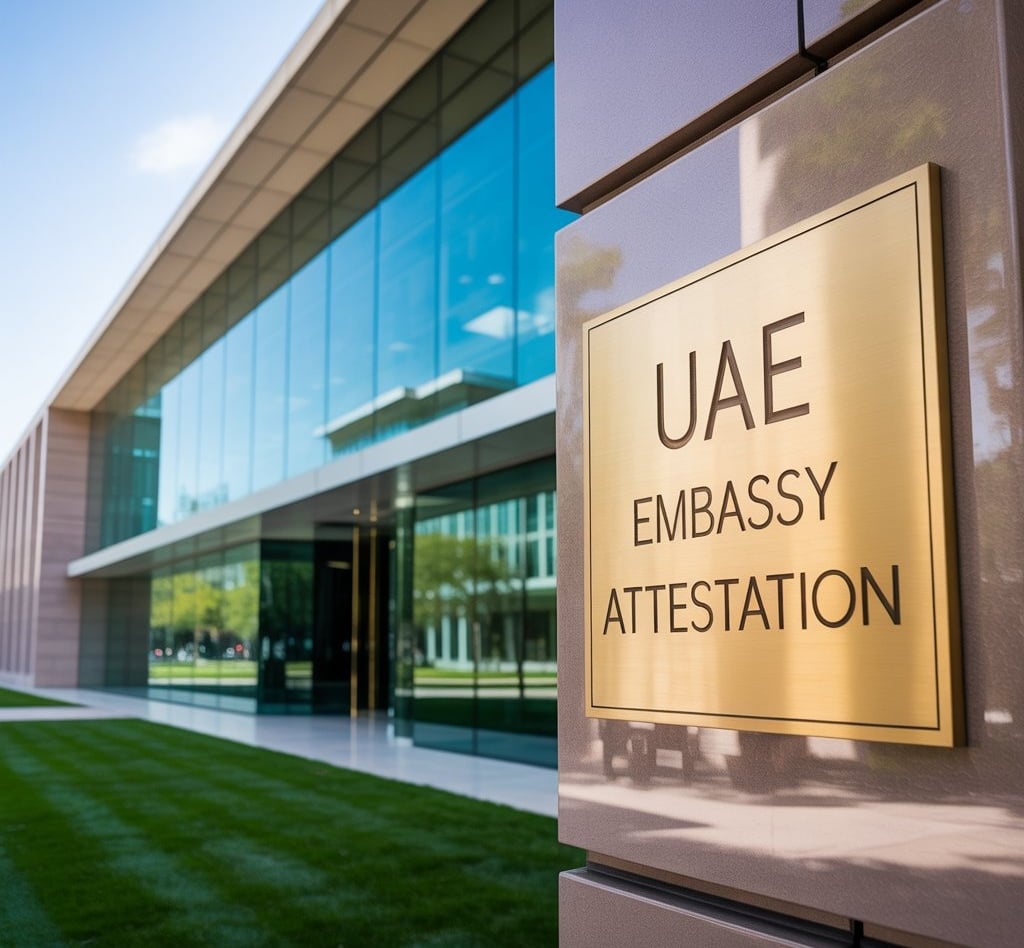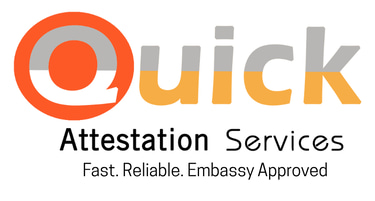UAE Embassy Attestation Guide in India "UAE embassy attestation"
Discover the complete guide to UAE embassy attestation in India. Learn about the necessary documents, fees, and timelines for a smooth attestation process. "UAE embassy attestation"
10/16/20257 min read


Introduction to UAE Embassy Attestation
UAE embassy attestation is a crucial process for individuals and businesses that seek to validate documents for use within the United Arab Emirates. This formal authentication procedure serves to confirm the legitimacy of various types of documents, thereby facilitating their acceptance in the UAE. The significance of attestation cannot be overstated, as it plays a vital role in ensuring that essential documents comply with legal requirements in the international context.
Typically, the types of documents requiring attestation include educational certificates, personal documents such as marriage and birth certificates, and commercial documents pertinent to business transactions. Each of these document categories holds its specific importance; for instance, educational institutions in the UAE may request attested degrees to verify the qualifications of prospective students, while businesses may need attestation for contracts and agreements to ensure their enforceability in a foreign jurisdiction.
The UAE embassy in India acts as the final authority in this attestation process, overseeing the verification of documents issued by Indian authorities. Applicants must navigate through a series of preliminary steps involving local notaries and state government verifications before the final attestation can occur. This diligent approach by the embassy ensures that all presented documents meet the required standards and are valid, thus establishing trust in international dealings. It is important for individuals and businesses to understand the prerequisites, timelines, and associated fees for embassy attestation to effectively prepare and expedite their applications.
In this context, the process of UAE embassy attestation is not merely bureaucratic; it serves as a fundamental requirement for legal recognition and acceptance of documents within the UAE's regulatory framework.
Types of Documents Requiring Attestation
Embassy attestation is a crucial process for individuals and businesses intending to use documents in the United Arab Emirates (UAE). Various categories of documents require this form of validation, which serves to authenticate the legitimacy of the documents for use in the UAE. The primary categories include personal, educational, and commercial documents.
Personal documents often encompass birth certificates, marriage certificates, and divorce decrees. For instance, a birth certificate must not only be issued by a recognized authority but also meet specific attestation criteria set by the UAE embassy. Marriage certificates similarly require proper verification and may need to be translated into Arabic if they are issued in another language. In cases of divorce, documentation proving the dissolution of marriage may also necessitate embassy attestation.
On the other hand, educational documents play a pivotal role for those seeking employment or educational opportunities in the UAE. This category includes degrees, diplomas, transcripts, and other certificates. Attestation of educational certificates usually requires verification from the institution that issued the document, followed by approval from local educational authorities before seeking embassy attestation. It is essential for individuals to ensure that their educational documents are stamped and signed, indicating their authenticity.
Lastly, commercial documents such as contracts, agreements, and business licenses are integral for businesses operating in the UAE. These documents must undergo an attestation process to ensure they are legally binding and recognized by UAE authorities. The requirements for commercial document attestation may vary depending on the nature of the document and the type of transaction involved. Businesses are advised to consult legal experts to ensure compliance with all necessary requirements.
Step-by-Step Attestation Process
The process of obtaining UAE embassy attestation in India involves several precise steps that must be followed to ensure that your documents are correctly authenticated. First and foremost, it is crucial to obtain a no-objection certificate (NOC) from the relevant state authorities. This certificate serves as an initial verification of your documents and is essential for further processing. Each state may have its own specific requirements and guidelines for issuing the NOC, which typically entails submitting your original documents along with any requisite application forms.
Once you have secured the NOC, the next step is the verification by the Ministry of External Affairs (MEA). This involves submitting your documents to the MEA, which confirms the authenticity of the NOC and verifies your submitted papers. The MEA’s stamp and signature are vital, as they are essential for proceeding to the UAE embassy. It is recommended to check the specific requirements and processing times with the MEA, as they may vary between states.
Upon receiving MEA verification, you can then proceed to the UAE embassy. At this stage, you will need to submit both the original documents along with their authenticated copies, including the MEA attestation. It is advisable to pre-fill the embassy application forms and ensure all necessary paperwork is organized to streamline the submission process. There may also be fees involved, which can vary based on the type of document being attested. Lastly, after submission, you will receive a collection receipt indicating when to return to pick up your attested documents. Generally, the attestation can take anywhere from a few days to a couple of weeks, depending on the embassy’s workload.
Required Documentation for Attestation
The process of UAE embassy attestation in India necessitates several specific documents, which vary according to the type of document being attested. It is essential to understand these requirements beforehand to facilitate a smooth attestation process. Below is a comprehensive checklist that outlines the necessary paperwork for common types of documents.
For personal documents such as birth certificates, marriage certificates, or educational qualifications, the following items are generally required:
- Original certificate that needs attestation.
- Photocopy of the certificate, which will be retained by the embassy.
- Valid passport copy of the applicant, serving as an identity proof.
- Passport-sized photographs, if specified by the embassy.
- If applicable, a divorce decree or death certificate for marriage-related attestation.
For commercial documents, including invoices, agreements, or business licenses, the requirement list modifies as follows:
- Original commercial document requiring attestation.
- Two sets of photocopies of the original document.
- Company registration certificate copy to authenticate the business.
- A cover letter from the company, specifying the purpose of attestation.
- Identity proof of the authorized signatory from the company.
In addition to the documents mentioned, applicants may also need to fill out a specific attestation application form, which can usually be obtained from the embassy's website or directly at the embassy. It is advisable to check the latest guidelines from the UAE embassy, as requirements may change periodically.
Having a complete set of documents as outlined in this checklist will significantly enhance the efficiency of the attestation process. Proper preparation ensures that applicants avoid unnecessary delays and complications.
Fees for UAE Embassy Attestation
Attestation of documents for use in the United Arab Emirates (UAE) involves various fees that can differ based on the nature of the documents and the services required. Understanding these fees is crucial for individuals and businesses to plan their budget effectively. Generally, the fees for UAE embassy attestation can be categorized according to the type of document being attested. For instance, common documents like educational certificates, personal documents, and commercial documents usually have specific attestation charges.
For educational certificates, the fee may range from INR 2,000 to INR 5,000, depending on the institution and the level of education. Personal documents, such as marriage certificates or birth certificates, often fall in a similar range, typically around INR 1,500 to INR 4,500. On the other hand, commercial documents, including invoices or certificates of incorporation, might incur higher fees due to their complexity, usually between INR 3,000 to INR 7,000.
In addition to the basic attestation fees, there may also be additional service charges that apply. These charges can include notary service fees, translation costs (if required), and courier expenses for the return of the documents. It is also worth noting that expedited service options are available at most agencies, which can significantly accelerate the processing time. However, these expedited services often come with an extra charge, typically ranging from INR 1,000 to INR 3,000.
It is advisable for individuals seeking UAE embassy attestation to conduct thorough research and get quotations from multiple service providers. This approach will help ensure that they receive the best service without incurring unnecessary costs. By having a clear understanding of the anticipated fees, applicants can navigate through the attestation process more efficiently.
Timeline for Attestation Process
The timeline for the attestation process of documents at the UAE Embassy in India is influenced by several factors, including the type of document being attested, the number of ongoing applications, and any unforeseen delays that may arise. Generally, the attestation process can be divided into standard timelines depending on these variables.
For standard documents such as educational certificates, including degrees and diplomas, the typical processing time can range from 5 to 15 working days. This timeframe can vary based on the embassy's workload at any given time. Additionally, documents such as marriage certificates or birth certificates may require a similar timeframe, often taking between 7 to 14 working days. This variability also depends on whether there are any specific verification procedures that the embassy follows for certain types of documents.
Moreover, applicants should consider external factors that can affect processing times. For instance, during peak seasons, such as summer months or around major holidays, the volume of applications tends to increase significantly, potentially elongating the final timeline. Furthermore, any discrepancies or additional verifications required can lead to delays. Therefore, it is advisable for applicants to ensure that all documents are complete and accurate before submission to minimize potential delays.
In instances where expedited processing is necessary, applicants may have the option to request express services, if available, for an additional fee. This can significantly reduce the time required for attestation, sometimes completing the process within two to five working days. However, it is essential to verify whether such service is offered specifically for the documents in question.
Common Challenges and Solutions
The process of obtaining UAE embassy attestation in India can present a variety of challenges. One of the most prevalent issues individuals face is misunderstanding the specific requirements for document verification. Each document may have different prerequisites, such as attestation from the relevant local authorities prior to submission to the UAE embassy. A common misconception is that all documents require the same level of attestation, leading to delays if individuals are unaware of the prerequisites.
Moreover, complications may arise due to inadequate documentation. For instance, if essential documents are missing or if individuals fail to provide the required number of copies, their attestation process might halt. To navigate this challenge, it is advisable to make a comprehensive checklist of all required documents, including identification proofs, educational certificates, and employment letters. Keeping both original and photocopy versions ready can help streamline the process significantly.
Another hurdle is the time factor involved in the attestation. Individuals often underestimate the duration required at various stages of the process, which can lead to frustration, especially if there are looming deadlines for visa applications. To alleviate this issue, it is recommended to anticipate the timeline by researching ahead of time, consulting the UAE embassy for their current processing timelines, and possibly seeking assistance from an agency that specializes in document attestations.
Lastly, navigating the bureaucratic terrain and encountering administrative errors can also impede progress. It's essential to stay organized and maintain direct communication with the embassy or attestation service providers. Keeping detailed records of each correspondence and retaining all receipts can provide a clear trajectory of your application process, helping in promptly addressing any issues that arise.
By understanding these common challenges and employing these practical solutions, individuals can enhance their chances of a smooth and efficient UAE embassy attestation experience in India.
